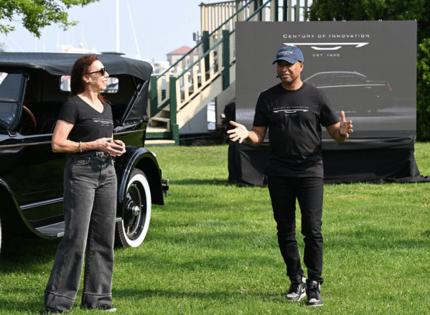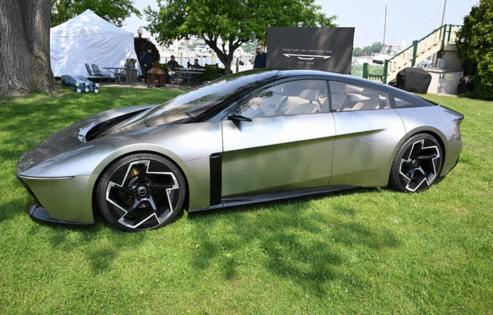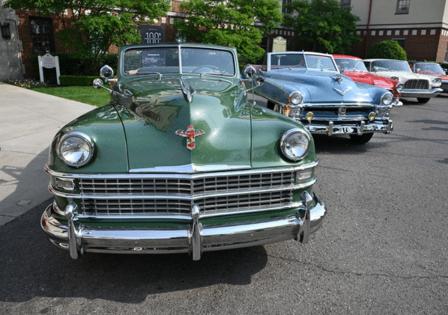Chrysler turns 100 years old this week. What's next for the storied brand?
Published in Automotive News
DETROIT — There was a tour back through Chrysler's 100-year history Wednesday on Belle Isle.
The storied carmaker started by Walter P. Chrysler on June 6, 1925, celebrated its century-long run by showing off stately old New Yorkers and 300s, the sleek Airflow and revolutionary Turbine Car, and old and new concept vehicles, including the brand's futuristic Halcyon.
More than 20 vehicles, including its first model, the 1924 Chrysler Six, dotted the lawn and parking lot of Belle Isle's Detroit Yacht Club, where the automaker's founder was once a member.
"Chrysler has always been ahead of its time, and while we've brought amazing products to life over the past 100 years, we're not done yet," Chrysler brand CEO Chris Feuell told a crowd of journalists and influencers as she promised another 100 years ahead.
Yet there have been real questions about whether Chrysler as a car brand can last another few years, let alone another century. After ending production of the 300 sedan in late 2023, it has sold only minivans — the Pacifica and, more recently, the more budget-friendly but nearly identical Voyager.
That's a remarkably narrow focus for a brand that not long ago sold sedans, wagons, SUVs and sports cars, and it's reflected in U.S. annual sales figures that are about 60% below their levels just a decade ago. Chrysler is also now part of a broad stable of 14 Stellantis NV brands that many industry watchers believe may soon need to be pared down by incoming CEO Antonio Filosa.
In an interview, Feuell acknowledged that new rumors about Chrysler's demise arise so frequently that it's almost like playing a weekly game of "whack-a-mole." But she said it's all "urban legend," and the company has an ambitious roadmap over the next several years.
"We had a lot of ups and downs last year, for sure, with some things that were going on internally with the company, and with the leadership changes," Feuell said of Stellantis. "And even during that time, there was never one conversation I had with Chairman (John) Elkann or any other member of the leadership team about Chrysler going away."
Filosa, she added, has been "extremely supportive of Chrysler," and backed efforts to invest more into the brand.
'Neglected'
A decade ago, Chrysler had a three-vehicle lineup of the 200 and 300 sedans and the Town & Country minivan. And a decade before that, in 2005, it marketed a far more expansive range with such vehicles as the Crossfire roadster, the PT Cruiser, a wagon version of the Pacifica, the Sebring coupe and sedan, and the stalwart Town & Country.
Feuell promised that new and updated products are coming for Chrysler after its lineup has steadily dwindled. First up will be a Pacifica minivan refresh early next year — including an overhauled front-end design, upgraded infotainment and interior features, and a new plug-in hybrid system.
In 2027, the brand plans to release a midsize hybrid crossover — its first all-new vehicle in two decades. And the CEO added there are longer-range plans to bring back a sedan or four-door coupe to the brand, though she declined to commit to a timeframe for that offering.
"I am very bullish on the car segment," Feuell said, noting that cars could be sold at more affordable price points, including in the "sweet spot" of $25,000 to $30,000.
Karl Brauer, executive analyst at iSeeCars.com, said Chrysler in recent years is a brand that "clearly has been neglected, and has suffered from a lack of consistent direction, product planning, and financial support."
That's not to say it can't turn things around by releasing great new products, he said. Chrysler needs to start competing in the highly popular compact crossover segment, which includes vehicles like the Honda CR-V and Toyota RAV4. And it should get back into luxury cars, he said — not because it would be a hot seller, but because upscale sedans are such a core component of the brand's history and image.
If it doesn't make moves soon, Brauer said it's not hard to see Chrysler going the way of Mercury, Plymouth, Oldsmobile or Pontiac. A central question, he added, is whether Stellantis will choose to invest more soon: "Indecision is the worst decision."
'Keep the energy going'
The Belle Isle gathering is one of several Chrysler centennial celebrations this year.
In April, Chrysler hosted a three-car display focused on the brand's history at the New York International Auto Show. In July, there is a celebration at the Carlisle Chrysler Nationals in Pennsylvania (which calls itself the world's largest Mopar event), with other similar gatherings also on the calendar. There will be a special-edition Pacifica coming out, and Stellantis leaders are putting together a time capsule filled with Chrysler artifacts from the past century.
There is indeed much to celebrate for a carmaker that played a key role in advancing aerodynamics, developed pioneering vehicles like the 1963 Turbine Car, created the modern minivan, navigated several periods of financial upheaval, and released an array of memorable designs over the years.
"Walter P. Chrysler's words about accessibility, it's always what we're after — obtainable goodness," said Ralph Gilles, Stellantis' chief design officer, who was involved in a number of noteworthy Chrysler designs in recent decades. "Every design we make is meant to make the owner feel like he or she paid twice as much as they actually did."
On Wednesday, it wasn't only Gilles reflecting on the founder who had taken an unusual route to automobiles, first training as a machinist and working in the railroad industry for many years.
Walter P. Chrysler eventually took a job at Buick and quickly rose up the ranks. By the early 1920s, he had taken a controlling interest in the struggling Maxwell Motor Company, which he would soon reorganize into a firm named after himself in 1925: Chrysler Corp.
"Walter Chrysler was someone who never forgot where he came from, and was always very humble ... he felt very fortunate to be part of growing the automotive industry," Feuell said. "He carried around — legend has it — a $1 bill that was representative of the first dollar that he ever made when he started Chrysler, and he had it folded and tucked into his hat that he wore every day."
Frank B. Rhodes Jr. is Walter P. Chrysler's 66-year-old great-grandson. He has made it his mission to publicly advocate for the Chrysler brand in recent years and ensure it doesn't go extinct.
The Maryland furniture maker had become increasingly concerned last year about Chrysler's future, but more recently, he said he has received encouraging messages from Feuell and Filosa stating they are committed.
Rhodes, who owns several Chryslers, including 300 sedans, said in an interview this week that the brand needs new products and should prioritize bringing back a car, while developing an image centered on "blue-collar luxury" — an upscale feel that's directed at the working class. He said he plans to keep advocating for Chrysler from afar, explaining that he feels an obligation as a family member of Walter P. Chrysler.
"I want to keep the energy going," Rhodes said.
©2025 www.detroitnews.com. Visit at detroitnews.com. Distributed by Tribune Content Agency, LLC.













Comments